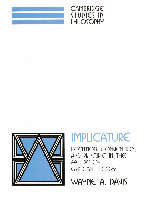3 - Determinacy and calculability
Published online by Cambridge University Press: 20 March 2010
Summary
Gricean theory holds that conversational implicatures must be capable of being worked out, which I call the Calculability Assumption. A key premise in the Working-out Schema is that the supposition that S believes p is required to make S's utterance consistent with the Cooperative Principle, which is the determinacy condition. Thus the Calculability Assumption holds only if the determinacy condition does. Grice s Razor entails that conversational implicatures can be derived from Grice's conversational principles. We observed in Chapter 1 that this derivability clause depends on the calculability assumption for sentence implicatures. Determinacy is thus the foundation of Gricean theory. In this chapter, we see that the determinacy condition, and therefore the Calculability Assumption and Grice's Razor, are untenable.
BACKGROUND CONSTRAINTS
Taken at face value, the determinacy condition is impossible to satisfy. There are too few constraints for the Cooperative Principle to require any particular beliefs. Unless word meanings are fixed, for example, the Maxim of Quality will not pick out a definite beliefs has to possess for his utterance to be truthful. The most we could say is that if the sentence S uttered means “It is raining,” then S must believe it is raining; if the sentence S uttered means “It is snowing,” then S must believe it is snowing, and so on.
- Type
- Chapter
- Information
- ImplicatureIntention, Convention, and Principle in the Failure of Gricean Theory, pp. 62 - 113Publisher: Cambridge University PressPrint publication year: 1998



